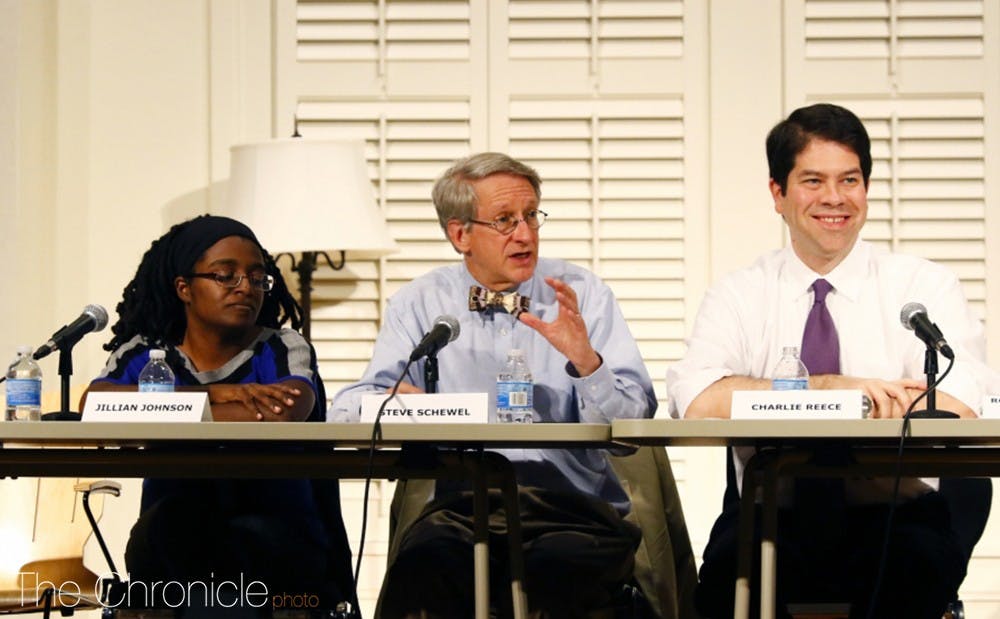Durham Mayor Steve Schewel, Trinity '73 and Ph.D. '82, visited campus on Monday to sit down with Duke students at the Kenan Institute of Ethics’ DoLunch event.
The discussion covered everything from gentrification and the Durham light rail to Duke’s role in the city.
“The beauty of our city is our diversity and the way we embrace it," Schewel said.
Schewel, a former Duke professor who was sworn in as mayor in December 2017, began by pinpointing gentrification as the issue at the top of his mind. He pointed out that Durham is a prosperous city, and gentrification comes with prosperity. He made it clear that, in his mind, stasis is not the opposite of gentrification—disinvestment is.
He highlighted the complexities of the city and the obstacles which accompany them. Durham was the fourth-fastest growing metro area in North Carolina in 2016. But Schewel said the city is, unlike other growing cities, fielding a diverse group of new citizens.
“We aren’t building housing that accommodates these people. That means prices are rising. Anyone that tells you they can stop this is not telling you the truth," Schewel said. "The question isn’t can we stop gentrification, it’s can we make a difference? And we can make a difference.”
Schewel said he sees wage increases as an important tool for equity in the midst of gentrification. He applauded Duke for its commitment to a $15 minimum wage and said he thought the implementation of it will be important for the city.
He noted, however, that wages are hard to control in North Carolina—a state in which the Republican-controlled General Assembly holds a great deal of power and is opposed to such changes.
Schewel pointed out that the city has greater control over housing in Durham than it does with wages. The first step to pushing back on gentrification, he said, is preserving housing that already exists. For the 15,000 families in the city who spend over 50 percent of their income on housing, Schewel said this aspect is critical.
New affordable housing is the next step. Schewel notes that it is particularly hard to require developers to accommodate lower income housing because of state law, but noted that although Durham “doesn’t have sticks, it does have carrots.”
New incentives for developers are being put in place to spur the creation of more low income housing, he said.
Schewel added that the $2.5 billion light rail coming to the area will provide new, good locations for building new housing. He noted that Duke may be slowing down the largest infrastructure project in North Carolina’s history by asking for aerial tracks in certain places, among other considerations, that could cost tens to hundreds of millions of dollars.
Duke has a major impact on the city, Schewel pointed out. Unless Durham thrives, Duke will not thrive, the mayor said. He added that the University’s increased wages and its role in driving downtown development, among other things, have made it critical in the "Durham renaissance."
At the same time, Schewel noted that the relationship between Duke and Durham is fraught.
"A lot of people see 'big, wealthy Duke.' A lot of people in Durham don’t have a lot," the mayor said. "And they want change.”
When asked about the strengths and shortcomings of undergraduate interaction with Durham, Schewel noted that undergraduates do a better job “than when [he] was here.” He said he thinks that programs like DukeEngage and activities like tutoring are great, and in addition to helping Durham they are critical for undergraduate students' growth.
When asked about noise complaints from the Durham community and a general perception of Duke students as arrogant, he acknowledged the seriousness and ubiquity of such complaints and urged students not to focus on the perception, but rather their behavior.
Schewel responded to a student's question about how he grapples with his identity as a white man who attended Duke and was born outside of Durham by pointing out that he has lived here and worked for the community since he was 18.
When asked about the new Amazon headquarters potentially being located in nearby Raleigh, Schewel laughed.
He pointed out that, though it is nice to be recognized as a great area, the new headquarters would likely be bad for the city. In addition to the increased traffic and need to offer financial incentives, he noted that bringing in the company “doesn’t change inequality—inequality driven by a history of racism.”
Get The Chronicle straight to your inbox
Signup for our weekly newsletter. Cancel at any time.

